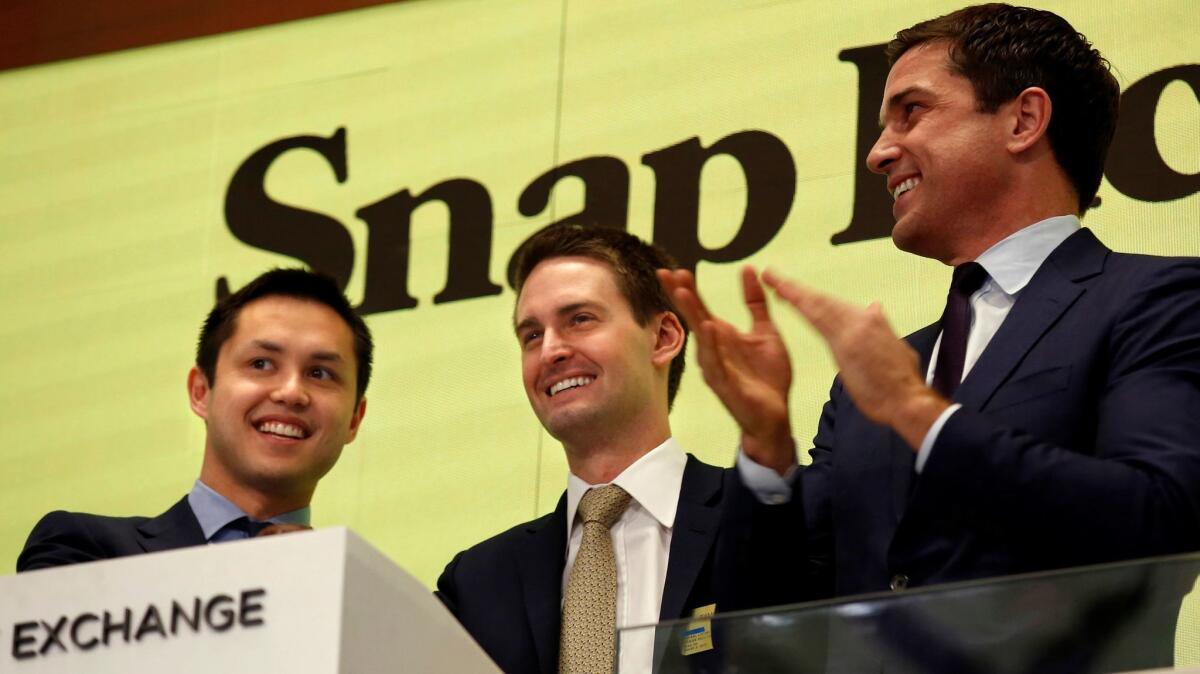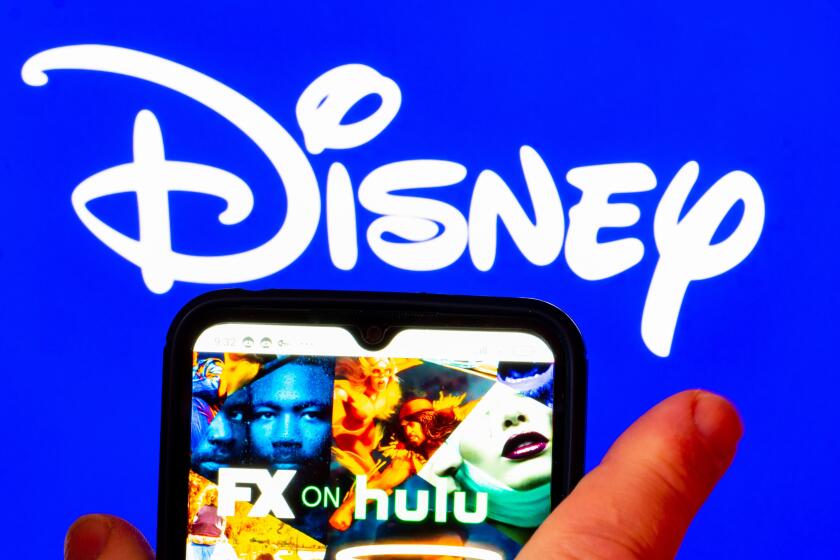S&P 500 will exclude Snap because its stock gives new shareholders no power

- Share via
Joining the Standard & Poor’s 500 — an index of the nation’s biggest and most popular stocks — has long been an important mark of validation for businesses. It signals that a company has ascended to corporate America’s elite and boosts its share price by about 5%.
But the recognition won’t be bestowed on Los Angeles’ largest and best-known tech company anytime soon. Snap Inc. and other companies that limit shareholders’ voting rights aren’t eligible to become new members of the S&P 500 under a rule that went into effect Tuesday.
The Snapchat app maker had irked major shareholder groups, including the retirement fund for California teachers, by becoming the first-ever company in the U.S. to issue only non-votable shares in its initial public offering. The March IPO was a rousing fundraising success for Snap, reaping the company and shareholders more than $3 billion.
But not giving common shareholders any say on mergers, board-member selection and other issues has led to a flurry of actions that financial experts say are designed to punish Snap and any firms that follow in its footsteps.
“Going to zero votes” angered “just enough people that the pendulum is swinging,” said Laura Martin, a financial analyst at Needham & Co. who provides ratings for media and tech stocks. “Investors don’t want to be forced to condone bad governance, and that’s an argument I think the S&P took very seriously.”
S&P Global said in a statement that its rule specifically bars companies with “multiple share classes” from its 500, MidCap 400 and SmallCap 600 indexes. Companies typically use such a structure to grant key executives and investors more votes than other shareholders.
In Snap’s case, the firm’s founders, Chief Executive Evan Spiegel and Chief Technology Officer Bobby Murphy, control about 90% of the company’s votes because they own shares with the most votes. The remaining votable shares are held by investors, board members and executives.
A handful of companies with bigger market capitalizations than Snap are affected by the change too, according to FactSet research data. They include media companies Altice and Liberty Broadband, business software makers Workday and VMWare and credit card processor First Data.
The new S&P provision adds clarity to a now-removed criterion that required members of its most popular index to have “a corporate governance structure consistent with U.S. practice.”
Existing members with multiple classes of stock, including Facebook and Alphabet, are exempted from the rule. Should any existing member change its structure to issue a new class of shares, S&P would take into consideration several factors before deciding whether to include that new class in its roster.
Getting rebuffed by the S&P 500 carries more consequence today than even a few years ago. An increasing amount of cash — trillions of dollars — has been invested in funds that match or at least closely follow the makeup of the S&P 500. Unlike the Dow Jones industrial average or the Nasdaq composite, the S&P index is viewed by investors as the best reflection of how the U.S. stock markets are doing.
Big companies that aren’t included will draw less attention from stock-pickers and analysts who study stocks, Martin said. Researchers have found S&P inclusion usually pushes share prices up several percentage points
“When anything cuts out interest, it’s going to affect the price,” she said. “You’re condemning yourself to lower valuations. It gives [investors] the option to ignore you.”
Mark Hebner, founder of Irvine money manager Index Fund Advisors, said investors have already factored the concern about the lack of voting power into the price of Snap shares. That means the company’s financial performance would play a bigger role in how its stock performs.
But he has no doubt there’s a message being sent to a generation of entrepreneurs.
“It’s telling companies we don’t want to be a shareholder when we don’t have a vote,” he said.
Media companies such as Viacom have used multiple classes of shares to insulate themselves from poltically charged investors who might try to exert influence over its news businesses or other operations.
Tech firms adopted the structure more recently, arguing that their young, visionary leaders had a strong grasp on how to run their companies. They wanted to ensure investors’ short-term whims wouldn’t cause distraction. Multiple share classes have also made it easier for companies to pursue acquisitions, donate shares and make other moves without diluting the power of existing shareholders.
S&P’s selection committee waits about six months to a year to add newly public companies to its indexes, meaning Snap could have been eligible as soon as next month. Of course, criteria about “financial viability” may have delayed Snap’s inclusion because the company isn’t close to generating profit.
Last month, Snap was excluded from the FTSE Russell 3000 index, with the manager and operator of the London Stock Exchange expressing similar concerns about nonvoting shares. The move followed polling in which investors in those funds expressed worries they would be forced to indirectly own Snap shares even though they rejected the idea of not having a vote.
A survey also was a key factor in S&P’s decision, the company said in a statement. Another index operator, MSCI, has yet to announce a new policy.
The largest index fund managers — Vanguard, BlackRock and State Street Global Advisors — have expressed frustration with the new stringent rules. But barring a major strategy change, they have little choice but to follow what S&P, FTSE Russell and MSCI choose to include in their listings.
Snap declined to comment on its relationship with index providers, who analysts say dealt a symbolic blow to the company.
“People aspire to be in the index without question,” said Scott Kessler of CFRA Research. “It’s a badge of honor, a rite of passage. But candidly, they have bigger fish to fry at this point.”
Snap’s share price has steeply declined since its IPO, in large part because of worries that the company won’t be able to maintain user growth and generate sustained profits. They fell 57 cents, or 4%, to $13.10 on Tuesday.
How companies will adjust to the pushback against Snap is unclear. Martin predicted investment bankers could devise a way for Uber Technologies and other IPO candidates to streamline into a single share class while limiting outsiders’ voting power.
Otherwise, “when Uber becomes public, they are going to have to make a horrible choice between being in the S&P 500 and losing founders’ control,” she said. “The Snapchat overreach hurt itself and affected every subsequent founder-controlled company.”
That includes meal kit delivery company Blue Apron Holdings Inc., which issued different share classes in its IPO in June. The company didn’t respond to a request for comment. Its shares — priced at $10 during the debut — fell 24 cents, or 3.6%, to $6.37 on Tuesday.
More to Read
Inside the business of entertainment
The Wide Shot brings you news, analysis and insights on everything from streaming wars to production — and what it all means for the future.
You may occasionally receive promotional content from the Los Angeles Times.










